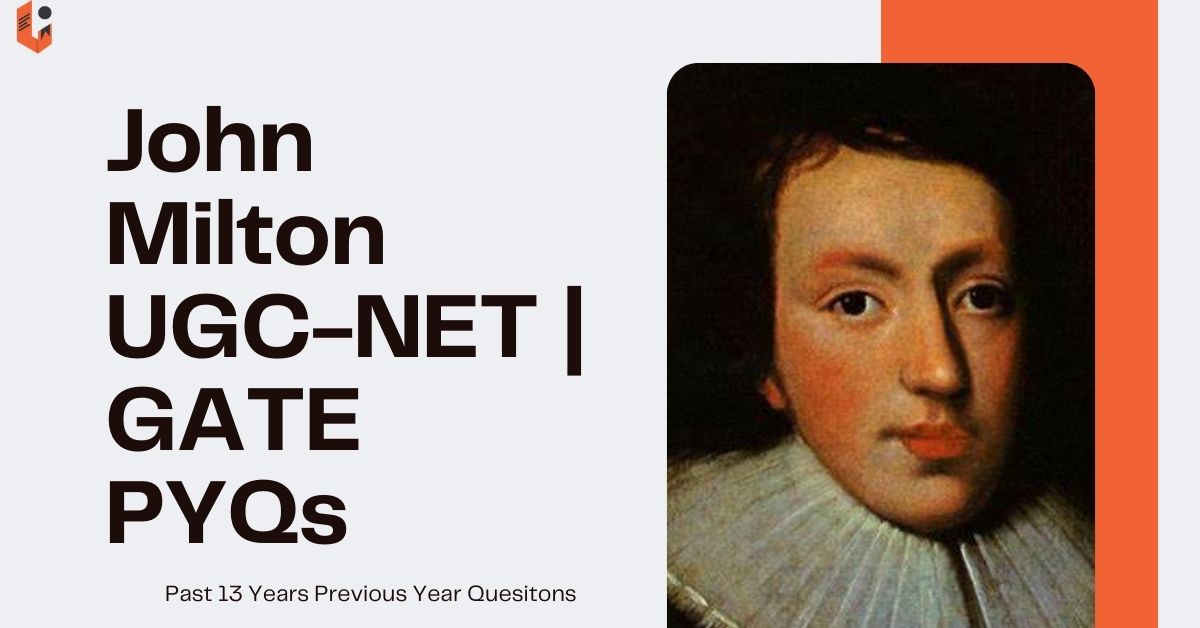UPDATE: Now, you can get these 3000+ questions in booklet/hardcopy format. Click here to know more.
John Milton Previous Year UGC-NET English
1. In Paradise Lost BK IX Milton writes that Adam was overcome with “______” and so ate the forbidden fruit against his “better knowledge”.
2. Who among the following English writers opposed the Licensing Act of 1643?
3. Who among the following was a contemporary of John Milton and wrote The Worthy Communicant? It is said that his prose “can be read easily, when Milton’s must be studied.”
4. In tracing the history of English poetry, Thomas Gray’s “Progress of Poesy” invokes a major poet as follows:
“Nor second He, that rode sublime
Upon the seraph-wings of Extasy,
The secrets of th’ Abyss to spy.”
Upon the seraph-wings of Extasy,
The secrets of th’ Abyss to spy.”
Who is “He”?
5. As Adam and Eve leave Paradise, “hand in hand with wand’ring steps and slow” (Book XII, Paradise Lost) what is their consolation?
6. Which of the following is NOT a punishment given by God to Adam and Eve as a consequence of tasting the forbidden fruit?
7. In Book 8, Paradise Lost Adam identifies his chief flaw or weakness to Raphael. What is this flaw?
8. Which of the following poems did Milton write in Octosyllabic Couplets?
9. What is ‘L’Allegro’s’ companion piece called?
10. Match the following elegies with the persons for whom they were written:
Elegies and Persons:
(i) Lycidas
(ii) Arthur Hugh Clough
(iii) Adonais
(iv) A.H. Hallam
(v) In Memoriam
(vi) Edward King
(vii) Thyrsis
(viii) Keats
11. Which of the following works of John Milton is an elegy?
12. Which of the following statement is NOT true of Areopagitica?
13. Which of the following are “companion poems”?
14. Match the following texts with their respective themes:
Texts:
I. Areopagitica (Milton)
II. Leviathan (Hobbes)
III. Alexander’s Feast (Dryden)
IV. The Way of The World (Congreve)
Themes:
i. Fashion, courtship, seduction
ii. The liberty For Unlicensed Printing
iii. Absolute Sovereignty
iv. The power of music
Codes: I II III IV
15. ________ the Almighty Power Hurled headlong flaming from th’ Ethereal Sky, With hideous ruin and combustion down To bottomless perdition, there to dwell In Adamantine Chains and penal Fire Who durst defy th’ Omnipotent to Arms. (Paradise Lost, I.44-49.)
________ the Almighty Power
Hurled headlong flaming from th’ Ethereal Sky,
With hideous ruin and combustion down
To bottomless perdition, there to dwell
In Adamantine Chains and penal Fire
Who durst defy th’ Omnipotent to Arms.
Hurled headlong flaming from th’ Ethereal Sky,
With hideous ruin and combustion down
To bottomless perdition, there to dwell
In Adamantine Chains and penal Fire
Who durst defy th’ Omnipotent to Arms.
Choose the appropriate word:
16. Milton introduces Satan and the fallen angels in the Book I of Paradise Lost. Two of the chief devils reappear in Book II. They are
Devils:
I. Moloch
II. Clemos
III. Belial
IV. Thamuz
The correct combination according to the code is:
17. “That glory never shall his wrath or might extort from me.” (Paradise Lost, Book I) What ‘glory’ is being referred to by Satan?
18. What is the name of the angel, who, of those who owed allegiance to Satan, dared to protest against his impious doctrine and left his company to return to God (Paradise Lost, Book V)?
19. The famous sonnet of John Milton beginning “When I consider how my light is spent…” ends with ……………
20. The opening sixteen lines of Paradise Lost comprise:
21. In Paradise Lost Milton presents the action of the fall of man in two stages in Books ………………
22. In the poem or invocation at the opening of Book 3, Paradise Lost, Milton asks for divine help in writing his epic. He states that he is in particular need of aid because he has what he considers to be a disability. What is it?
23. In Paradise Lost which character narrates the story of the making of Eve from a rib in Adam’s side?
24. Identify the correct chronological sequence of publication:
25. Who is the only one of Milton’s contemporaries to be mentioned by name in Paradise Lost?
26. In Paradise Lost Milton invokes his ‘heavenly muse’, ‘Urania’, at the beginning of which two books?
Books:
(a) Book I
(b) Book IV
(c) Book IX
(d) Book VII
Choose the correct option:
27. Which of the following is the correct chronological order of publication of the following poems?
28. Which of the following arrangements of prose-pamphlets is in the right chronological order?
29. From whose work did John Milton take the epigraph to his Areopagitica?
30. Which book of Paradise Lost incorporates the speech rhythms of Adam and Eve’s marital quarrel?


Sir, Milton invoked muse in book 1 and 4.
I am confused.
No, the muse Urania was invoked in Book I and VII.
Lines from Book I- “Sing, Heavenly Muse, that, on the secret top
Of Oreb1, or of Sinai2,”
The opening line of Book VII- “DEscend from Heav’n Urania, by that name
If rightly thou art call’d,”
yes you are right ..
Heartfelt thanks to team limitless literature for providing suchhigh quality content .
Thank you